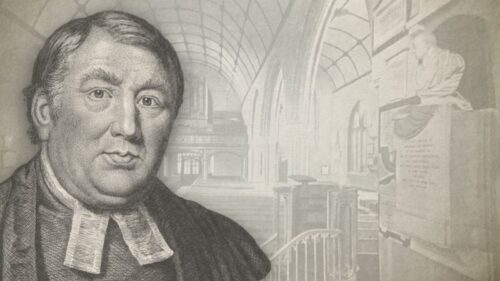
March 8—Morning Devotion
“From this day will I bless thee.”—Haggai 2:19
My soul, what day is the memorable day to thee from whence commenced thy blessings? No doubt from everlasting the Lord hath blessed his people in Jesus. But the commencement of thy personal enjoyment of those blessings, was at the time the Lord graciously laid the foundation of his spiritual temple in thee; the blessed, the gracious, the auspicious, the happy day, when the Lord made thee willing in the day of his power? Oh! blessed day, never, never to be forgotten! A day of light; when the light of Jesus first broke in upon me. A day of life; when the Lord Jesus quickened my poor soul, which before was laying dead in trespasses and sins. A day of love; when his love first was made known to my soul, who so loved me as to give his dear and ever-blessed Son for me: and his love was sweetly manifested, who so loved me as to give himself for me. A day of the beginning of victory, over death and hell, and the grave. A day of liberty; when the Lord Jesus opened my prison doors and brought me out. A day of wonder, love and praise; when my eyes first saw the King in his beauty, and my whole soul was overpowered in the contemplation of the grace, the glory, the beauty, the loveliness, the suitableness, the all-sufficiency of his glorious Person and glorious work. A day, Oh what dear name shall I term it to be? A day of grace, a jubilee, a salvation day! the day of my espousals to Jesus, and of the gladness of my Redeemer’s heart! And, my soul, did thy God, did thy Jesus say, that from that day he would bless thee? And hath he not done it? Oh, yes, yes; beyond all conception of blessing. He hath blessed thee in thy basket and thy store. All the blessings, even in temporal mercies, which were all forfeited in Adam, are now sweetly restored, and blessed, and sanctified, in Jesus: nay, even thy very crosses have the-curse taken out of them by thy Jesus; and thy very tears have the spiced wine of the pomegranate. And as to spiritual blessings, God thy Father hath blessed thee with all in his dear Son. Thy Father hath made over himself, in Jesus, with all his love and favour. And Jesus is thine, with all his fulness, sweetness, all-sufficiency. And God the Spirit, with all his gracious influences and comforts. And the present enjoyment of these unspeakable mercies becomes the sure earnest of blessings which are eternal. Jesus himself hath declared, that it is the Father’s own gracious will that he should give eternal life to as many as the Father hath given him; and therefore eternal life must be the sure portion of all his redeemed. “He that believeth in the Son hath indeed everlasting life; and Jesus will raise him up at the last day.” Pause, my soul, and view the vast heritage to which thou art begotten from the day of thy new birth in Jesus, Oh! most gracious Father, let me never lose sight of those sweet words, nor the feeling sense of my interest in them, in which thou hast said, “From this day will I bless thee.”
Robert Hawker (1753-1827) was an Anglican (High-Calvinist) preacher who served as Vicar of Charles Church, Plymouth. John Hazelton wrote of him:
“The prominent features…in Robert Hawker's testimony…was the Person of Christ….Dr. Hawker delighted to speak of his Lord as "My most glorious Christ.” What anxious heart but finds at times in the perusal of the doctor's writings a measure of relief, a softening, and a mellowing? an almost imperceptible yet secret and constraining power in leading out of self and off from the misery and bondage of the flesh into a contemplation of the Person and preciousness of Christ as "the chiefest among ten thousand and the altogether lovely." Christ and Him crucified was emphatically the burden of his song and the keynote of his ministry. He preached his last sermon in Charles Church on March 18th, 1827, and on April 6th he died, after being six years curate and forty-three years vicar of the parish. On the last day of his life he repeated a part of Ephesians 1, from the 6th to the 12th verses, and as he proceeded he enlarged on the verses, but dwelt more fully on these words: "To the praise of His glory Who first trusted in Christ." He paused and asked, "Who first trusted in Christ?" And then made this answer: "It was God the Father Who first trusted in Christ."
Robert Hawker on the Biblical Covenants (Complete)
Robert Hawker's Poor Man's Morning Portions





